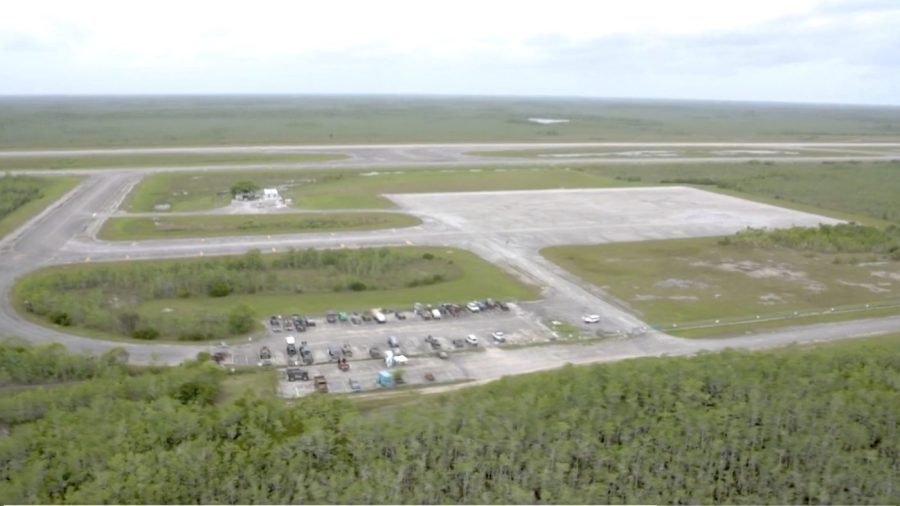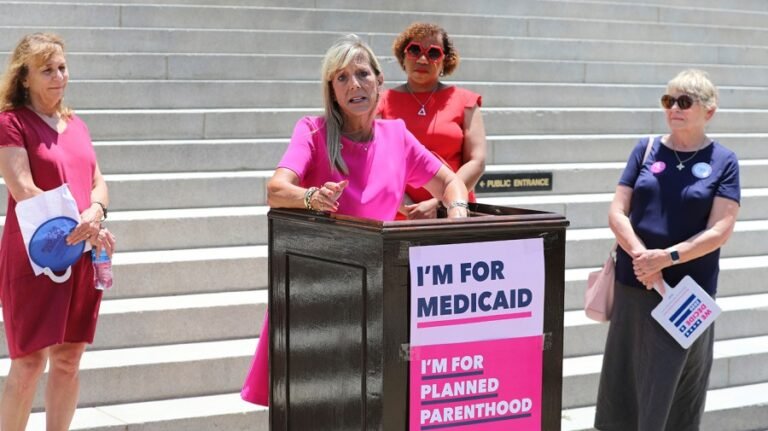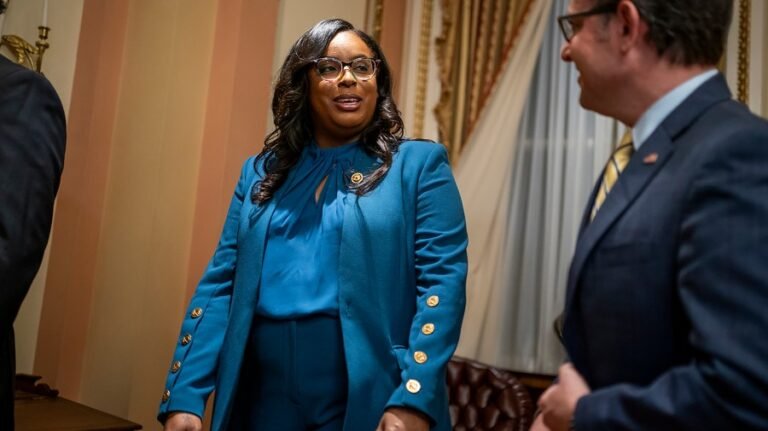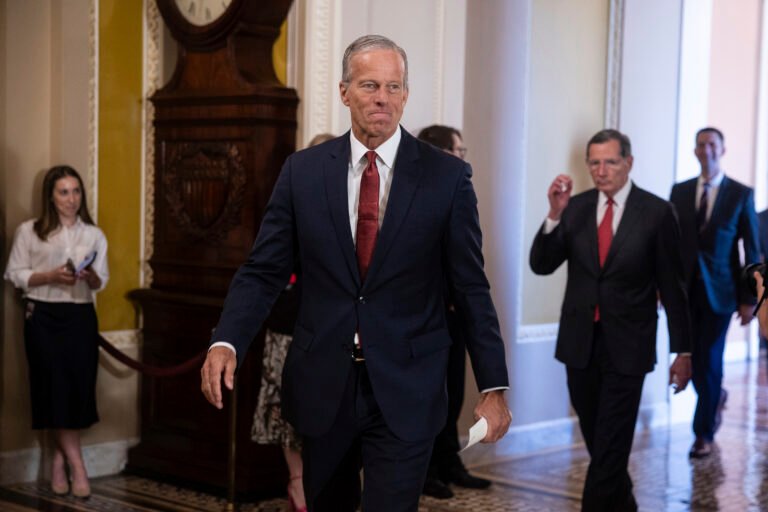
The Trump administration and Florida leaders are moving forward with a plan to build a detention facility on a remote site nestled in the state’s swampy Everglades to hold undocumented migrants awaiting deportation.
The site, dubbed “Alligator Alcatraz,” could open with soft-sided holding units for hundreds of detainees in the coming days through a partnership where the federal government will provide funding and the Florida Division of Emergency Management (FDEM) will oversee the build out and management. Additional holding units will be added through next month, under the agreement.
The facility is projected to cost about $450 million a year, which will come from the Federal Emergency Management Agency’s (FEMA) Shelter and Services Program that was used to house asylum-seekers during the Biden administration.
“Under President Trump’s leadership, we are working at turbo speed on cost-effective and innovative ways to deliver on the American people’s mandate for mass deportations of criminal illegal aliens,” Department Homeland Security (DHS) Secretary Kristi Noem said in a statement this week. “We will expand facilities and bed space in just days, thanks to our partnership with Florida.”
The DHS-approved plans will allow the new Florida facility to hold immigrants arrested in the Sunshine State, as well as transfers from U.S. Immigration and Customs Enforcement (ICE) officers.

The Florida state flag waving along with the USA flag. (Getty Images)
Why Florida?
Florida Gov. Ron DeSantis’s (R) administration pitched the partnership to the federal government in a 37-page “Immigration Enforcement Operations Plan” earlier this year outlining the state’s requests for reimbursements and looser restrictions on addressing unauthorized immigration.
“Governor DeSantis has insisted that the state of Florida, under his leadership, will facilitate the federal government in enforcing immigration law,” the governor’s office said in a statement to The Hill. “Utilizing this space and/or others around the state, Florida will continue to lead in immigration enforcement.”
In the partnership proposal, Florida officials noted that the state’s “geographic position, ambient culture, and the confluence of three major interstate highways (I-10, I-75 and I-95) have made it attractive to criminal organizations smuggling everything from aliens to drugs to guns and money.”
A July 2024 Pew Research Center report on unauthorized immigrant communities in the U.S. found that Florida’s swelled by at least 400,000 people from 2019 to 2022 — more than any other state in the country — and estimate its total undocumented migrant population at about 1.2 million.
The Florida proposal argued “the nature and vast scope of the illegal alien presence deserves a rethinking of detention processes and standards” and urged the Trump administration to waive some ICE detention standards.

Isolated Everglades airfield outside Miami that Florida officials said an immigration detention facility dubbed “Alligator Alcatraz” is just days away from being operational. (Courtesy of the Office of Attorney General James Uthmeier via AP)
Why this location?
The Dade-Collier Training and Transition Airport, located in Ochopee, Fla. — about 36 miles south of Miami — is owned by the Miami-Dade County government.
The nearly 40-square-mile site was first developed in the late 1960s with plans to become a major hub, but the project fizzled because of environmental concerns, leaving just a single strip that has been used as a training site and for rare general aviation needs.
Florida officials touted the strip as a benefit because it will allow migrants to be flown into and out of the holding facility without much disruption.
In a video coining the site a potential “Alligator Alcatraz,” Florida Attorney General James Uthmeier (R) highlighted its remote location as a bonus.
“People get out, there’s not much waiting for them other than alligators and pythons —nowhere to go, nowhere to hide,” Uthmeier said in a video shared on social platform X. “Within just 30 to 60 days after we begin construction, it could be up and running and could house as many as 1,000 criminal aliens.”

Florida Attorney General James Uthmeier speaks at the Florida Capitol in Tallahassee, Fla., on March 5, 2025.
State takeover
FDEM initially offered to buy the Dade-Collier Airport from Miami-Dade County, but DeSantis’s administration couldn’t reach an agreement with local leaders on the price, so the state instead moved to take it over, using the governor’s emergency authority.
FDEM executive director Kevin Guthrie wrote in a letter to Miami-Dade County Mayor Daniella Levine Cava (D) on Monday that the agency would “begin immediate utilization of the improved area of the site, as I now deem it necessary to meet the Division’s current
operational demands in coping with the emergency.”
“Time is of the essence,” Guthrie wrote. “We must act swiftly to ensure readiness and continuity in our statewide operations to assist the federal government with immigration enforcement.”
The director added that the state would maintain control of the site as long as DeSantis’s state emergency declaration over immigration remains in effect.
DeSantis’s initial declaration was issued in June 2023, citing “mass migration of unauthorized aliens, including the associated abandonment of vessels, without appropriate support from the federal government, [that] has created an unmanageable strain on local resources and will continue to overburden the capabilities of local governments throughout the state.”
He has renewed the order in 60-day intervals, as required under Florida law, in the months that followed. The most recent extension was issued June 3 and will expire Aug. 2, unless it is again extended.

Miami Dade County Mayor Daniella Levine Cava speaks Wednesday, June 11, 2025, in Miami. (AP Photo/Marta Lavandier)
Mayor weighs in
Levine Cava, who has been the Miami-Dade mayor since 2020, told The Hill in a statement that she’s concerned that state government is moving too fast on the project without fully evaluating its impact.
“We understand that state agencies under the Governor’s direction have broad authority to take action under declared states of emergency, but the rapid pace of this effort has provided little opportunity for due diligence given the potential significant impacts to our community,” she said.
The mayor highlighted the potential environmental harm the facility could have on the surrounding Everglades.
“The state of Florida, alongside the federal government, has invested billions of dollars – including $6.5 billion under Governor DeSantis’s leadership – in Everglades restoration, given the critical importance of the Everglades not only to our environment and clean drinking water, but as the bedrock foundation of our state’s $1 trillion tourism economy,” Levine Cava continued. “The Governor’s office has stated ‘operations on site will be completely self-contained,’ but we continue to have concerns about how a facility at this scale can operate without impacts to the surrounding ecosystem.”
She also pointed out the state initially offered to purchase the property for $20 million, which is about a 10th of the value according to the most recent property appraisal.
“Given financial strain the County is facing, in part due to continued pressure from proposed state budget reductions and demands on local revenue, it is critical that we maximize the value of all taxpayer assets on behalf of our residents,” the mayor wrote.


